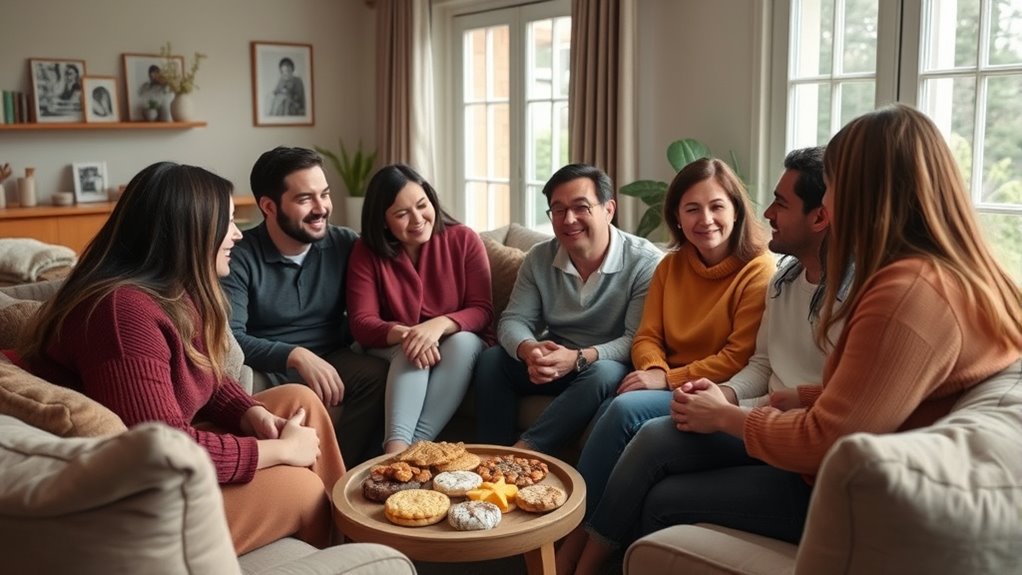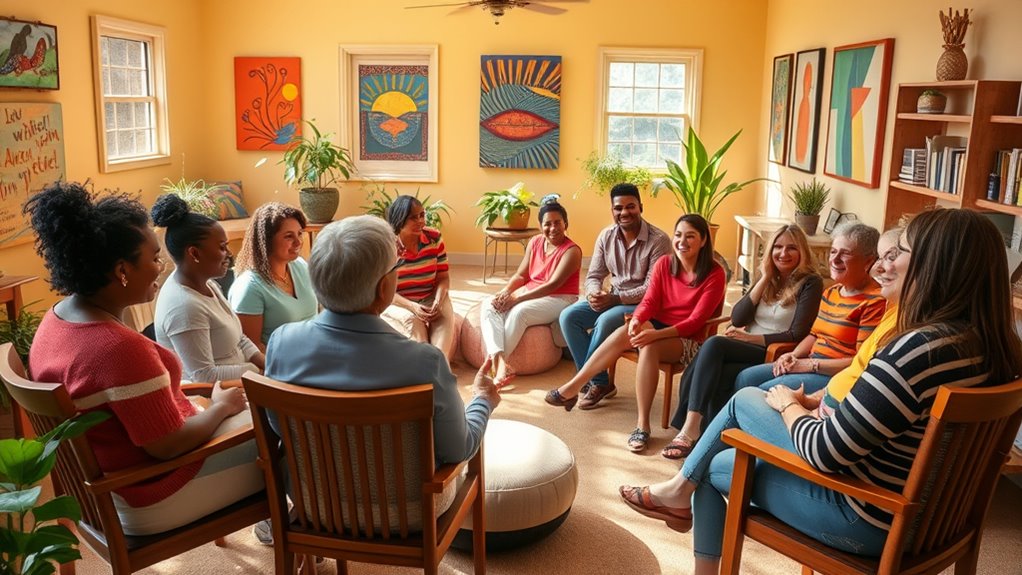Building a support network with friends, family, and community involves creating trust through honest communication, setting boundaries, and staying consistent. Connecting with local support groups, online communities, and mental health resources offers ongoing assistance. Educate yourself about BPD and involve others in your care plan to foster understanding. Developing these connections promotes stability and resilience. If you want to learn more about strengthening your support system, there’s helpful guidance to explore further.
Key Takeaways
- Establish structured support systems like therapy, case management, and crisis services to ensure safety and ongoing care.
- Foster open, honest communication and set boundaries to build trust and emotional safety with friends and family.
- Connect with community resources, support groups, and online platforms to reduce isolation and share experiences.
- Educate yourself about BPD to enhance empathy and participate in programs like Family Connections™ for stronger relationships.
- Use mental health technology for remote monitoring, continuous engagement, and managing symptoms effectively.
Understanding Your Social Network and Its Challenges

Understanding your social network is essential for managing BPD, as your relationships can profoundly impact your emotional well-being. You might find yourself engaging more intensely with social media, seeking validation through online interactions. This can make your identity feel more unstable, especially since social media often presents a curated version of life that can distort your self-perception. Online relationships tend to be unstable, mirroring the patterns you experience in real life, which can increase feelings of insecurity. The instant gratification from social media can also lead to compulsive behaviors, triggering impulsivity and emotional distress. While social media might seem like a quick fix, it can create a cycle of reliance that makes managing emotions even harder. Recognizing these challenges helps you develop healthier strategies for social connection. Behavioral features of social media use, such as salience and withdrawal, can exacerbate existing difficulties in emotional regulation and interpersonal stability. Additionally, the symptoms of breast cancer, like changes in the body or persistent pain, can add to emotional stress, making it even more important to seek support and maintain a strong social network. Developing healthy boundaries around social media use can help protect your emotional health and foster more stable relationships.
Building Trust and Open Communication With Close Relationships

Building trust and maintaining open communication are key steps in strengthening your close relationships, especially when managing BPD. Consistency in your actions and words fosters reliability, creating a sense of safety. Being honest and transparent helps your loved ones understand you better, while showing empathy encourages a trusting environment. Respecting personal boundaries maintains emotional safety and mutual respect. Clear language reduces misunderstandings, and active listening shows that you value their feelings and concerns. Providing constructive feedback and encouraging emotional expression build openness. Patience during conversations helps prevent misunderstandings and fosters rapport. Addressing trust issues through therapy, self-awareness, and emotional regulation strengthens your relationships. Additionally, demonstrating reliability through consistent effort can reinforce a sense of security and predictability in your relationships. Building skills in emotion regulation can further enhance your ability to maintain stability in your connections. Engaging in support networks provides additional stability and shared understanding that can bolster your relationships. Recognizing the importance of tent camping environments and nature-based activities can also promote relaxation and emotional well-being. Incorporating protective styling techniques, such as crochet styles for locs, can also serve as a form of self-care that promotes confidence and emotional well-being. By collaborating on decisions, offering reassurance, and respecting autonomy, you create a supportive, trusting environment that nurtures your connections.
Connecting With Supportive Community Programs and Resources

Are you aware of the many community programs and online resources available to support those managing BPD? Connecting with these resources can make a big difference. Support groups like Emotions Matter offer peer-led meetings at no cost, providing a safe space to share experiences. The Society of BC offers virtual groups facilitated by coaches and therapists, making support accessible from home. Online communities such as The Mighty connect you with others living with BPD and mental health challenges. Local organizations, community centers, and hospitals also host support groups, workshops, and educational events. Additionally, online courses like the National Education Alliance for BPD offer free skills training for supporters. Utilizing these programs helps you build a strong, informed, and supportive network to navigate your journey with BPD. 988 Suicide and Crisis Lifeline provides immediate crisis support and is available nationwide 24/7, offering an essential resource for urgent help when needed.
Navigating Support From Friends and Family Effectively

Supporting someone with BPD can be challenging not just for the individual, but also for friends and family who want to help. The emotional impact often leads to stress, guilt, and feelings of helplessness, which can strain relationships and disrupt family dynamics. Balancing your responsibilities while managing unpredictable behaviors can cause exhaustion and burnout. To navigate this effectively, use clear and consistent communication to foster emotional safety. Establish firm but compassionate boundaries to reduce conflicts and protect everyone’s well-being. Practice validation techniques to acknowledge emotions without endorsing problematic behaviors, helping de-escalate crises. Educate yourself about BPD to build empathy and avoid misunderstandings. Remember, supporting someone with BPD requires self-care and patience, ensuring you can remain a steady, compassionate presence. Research funded by the National Institute of Mental Health shows that family members who participate in structured programs like Family Connections™ report decreased feelings of depression, burden, and grief, and increased feelings of empowerment, which can further enhance your ability to provide support. Additionally, understanding emotional regulation strategies can help you respond more effectively during difficult interactions. Recognizing the importance of consistent boundaries can also prevent burnout and promote healthier relationships. Developing skills in interpersonal effectiveness can improve communication and reduce conflicts, making the support process more sustainable for all involved. Building your knowledge about psychological treatments can also help you support recovery and manage expectations more effectively.
Enhancing Your Support System for Long-Term Well-Being

Have you considered how expanding your support network can promote long-term well-being for both you and your loved one with BPD? Engaging with community-based resources like Assertive Community Treatment (ACT) and Community Mental Health Teams (CMHTs) offers ongoing, holistic support that fosters independence. Partnering with local non-profits and mental health organizations can further broaden access to specialized services. Participating in peer support groups enhances empowerment, hope, and emotional safety through shared experiences. Leveraging professional resources like DBT and CBT, along with case management, ensures continuous care and symptom monitoring. Building social skills through support groups improves communication and boundary-setting. A diverse, structured support system creates a sense of safety, reduces social isolation, and strengthens resilience during life’s challenges and crises. Care and crisis management in BPD can help you navigate difficult moments more effectively, ensuring both immediate safety and long-term stability. Additionally, integrating community resources into your support plan can provide vital assistance tailored to individual needs and circumstances. Considering the role of mental health technology can also enhance ongoing engagement and monitoring for those with BPD. Understanding divorce guidance and related legal and emotional aspects may also be beneficial when navigating complex family dynamics and support systems.
Frequently Asked Questions
How Can I Identify Which Friends Are Truly Supportive?
To identify truly supportive friends, pay attention to how they listen and respond. Do they validate your feelings without judgment? Are they respectful of boundaries and consistent in their actions? Supportive friends stay calm during emotional moments, encourage your growth, and promote seeking help when needed. They don’t criticize or dismiss you but instead offer stability, understanding, and encouragement, making you feel safe and valued in your friendship.
What Are Signs That My Support Network Needs Strengthening?
You notice your support network needs strengthening when interactions feel consistently negative or unhelpful. If boundaries are repeatedly crossed, communication leads to conflicts, or your feelings are dismissed, it’s a sign things aren’t healthy. When your relationships lack empathy, understanding of BPD, or professional guidance, your support system may be insufficient. These signs suggest it’s time to seek more effective support, education, and healthier connections to better manage your wellbeing.
How Do Cultural Differences Influence Support for BPD?
Cultural differences greatly influence how support for BPD is provided and received. You might find that family and community play a bigger role in collectivist cultures, offering more direct involvement, while individualist cultures emphasize personal friendships. Cultural norms shape emotional expression and coping strategies, so support systems should be culturally sensitive. Recognizing these differences helps you build a more effective, understanding support network that respects your background and needs.
Can Online Communities Provide Meaningful Support for BPD?
Did you know that 70% of online support group members report feeling less isolated? Online communities can offer meaningful support for BPD by providing accessible, anonymous, and flexible spaces to share experiences and learn coping skills. You can connect with others from diverse backgrounds, gain new perspectives, and complement traditional therapy. While they aren’t a replacement, these groups can be a valuable part of your overall support system.
What Strategies Help Maintain Support Over Time During Crises?
To maintain support during crises, you should keep communication open and honest. Clearly share your needs and boundaries, and educate your support network about BPD to foster understanding. Use non-judgmental language to validate feelings, and regularly check in to reassess your needs. Developing a crisis plan and involving trusted friends or community resources guarantees ongoing support, helping you feel less isolated and more supported through tough times.
Conclusion
Remember, building a support network takes time and effort, but you’re not alone. Be honest, communicate openly, and lean on those who understand and care. Trust is the foundation, and patience is key. As the saying goes, “A journey of a thousand miles begins with a single step.” Keep moving forward, and over time, you’ll create a strong, supportive community that helps you thrive with BPD.









